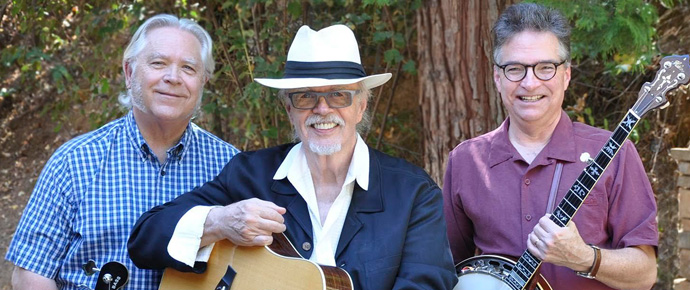
Wally Barnick, Dan Crary, and Bill Evans
At age 80, Dan Crary can cite any number of accomplishments. Having accumulated an impressive career that spans over half a century, one that includes performances in every state in the nation, concerts in over 30 countries, and a like number of albums that have found him playing a major role, Crary is rightly considered one of the world’s leading exponents of flatpicking guitar. He’s not only been elevated to the front line of contemporary bluegrass guitarists, but also earned kudos for a theatrical concert series he created titled Primal Twang, which illuminates the entire history of guitar.
“My first big music passion was the guitar,” Crary recalls. “I heard an old Kansas City country singer named Don Sullivan play the jangly steel string guitar on the radio, asked my folks if I could play one. Amazingly, they said yes, bought me a guitar, and found a guitar teacher to give me lessons. Very few kids played the guitar in those days, but I did and it changed everything for me.”
The early ‘50s was a time of change and transformation, and indeed it was fortuitous that Crary found his fascination with the guitar when he did.
“Folk music was very hard to find, but bluegrass was on the radio,” Crary explains. “However in 1952, the only place you heard bluegrass was once or twice a day on country music radio… so our family doctor loaned me a 1940s Webcor wire recorder he had used as a dictation machine. When a bluegrass piece came on, I would hurry and turn the thing on and after the tubes warmed up, I could record the last two thirds of the song. One of the first recordings I remember was Flatt and Scruggs’ Jimmy Brown The Newsboy from the early ’50s, still one of the most beautiful guitar recordings ever made.”
Nevertheless, his destiny wasn’t set in stone early on. After being given that first guitar at the age of 12, and then graduating high school, he went off to college to study theology. He first relocated to Lawrence, Kansas, and while attending Golden Gate Baptist Theological Seminary, he began playing and singing with a group called the Carltons, making some side money at the same time.
“For me, the way into music was the guitar, and the music was traditional, and everything after that was derived from that,” Crary says in retrospect. “The guitar is still the great miracle of music to me, when I hear one, I still think it’s God’s gift to humanity that can make us peaceable and neighborly, and keep us sane, and surround us with sounds that are beautiful.”
In 1967, Crary moved again, this time to Louisville, Kentucky where he pursued a doctorate degree in philosophy. Nevertheless, his interest in music never wavered. He became a co-founder of a group called The Bluegrass Alliance and in 1970, he released his first album, aptly titled Bluegrass Guitar.
Crary didn’t record again for another five years, but when he did, he started an upward spiral that continues to this day. His early initiatives found him working in the company of renowned fiddler Byron Berline and his band Sundance. He then formed a trio with Berline and banjo player John Hickman, a group that eventually morphed into a combo called California. It was a highly-lauded ensemble, courtesy of their wins for IBMA’s Instrumental Group of the Year honors three years in a row, from 1992 through 1994.
Crary was etching his reputation as a bluegrass picker, and it’s been his lifeblood ever since.
“I’m not sure what gets a person hooked on a kind of music,” Crary suggests. “The first genre of music to grab me was folk music. My Grandma gave me a Burl Ives record when I was 12 years old, and even then it knocked me out. I was fascinated by the thought that I could hear or sing a song somebody made up hundreds of years ago. But something in the sound was the real hook; and when I heard bluegrass, and later, early music — medieval and renaissance — the particular sounds made me really want that music. I read somewhere that when the great cellist Jacqueline Du Pre was a child of four, she heard a cello on the radio and told her father, ‘Daddy, I want what makes that noise.’ That was the whole thing with bluegrass and the guitar for me — I wanted what made that noise.”
He continues to make that noise even now, having performed in a variety of venues, from Lincoln Center and other great concert halls, to the hundreds of house concerts, music store gigs, and festivals he plays on an ongoing basis. “In 1969 at a Louisville, Kentucky concert our band, The Bluegrass Alliance, was heard by Carlton Haney, the man who started the first bluegrass festivals. He booked us at his Reidsville, North Carolina festival in 1969. It was my first performance before a national bluegrass audience. We were the only band that featured the guitar as both rhythm and solo instrument. I was the only flat picker whose band let him solo in the music. It got a lot of attention, and it really started my own career in the music.”
When asked what the the biggest venue he’s ever played, he mentions the Walnut Valley Festival in Winfield, Kansas. “I played the first one in ’72, and then most of the rest of them ever since,” he says. “I’m scheduled to play this year in September, which will be the 49th and I’ll be at the 50th in 2021. It’s the first and greatest flatpicking-focused festival, and they have been extraordinarily loyal and kind to me over the years.”
Nowadays, Crary and his wife of 39 years, Laree Kiely, live in Placerville, California, but his drive and determination remain as elevated as ever. He’s especially enthused about his current project, a trio which also features Bill Evans on banjo, and singer and bassist Wally Barnick. “Both these guys are music veterans with worldwide reputations for excellence and innovation,” Crary insists. “Bill is not only one of the major innovators and performers of this generation, and one of the great banjo virtuosos of all time, he’s also the author of the most widely distributed book on the banjo in that instrument’s history. His recordings are monumental and beautiful. Wally is a founder of The Cache Valley Drifters, a classic band of the ’80s. He is still recording and performing classic bluegrass and old time music. His singing is eerily beautiful and soulful, one of the greatest singers of his generation. And after a half century of performing, he still cuts it and breaks your heart with a song. It’s amazing that I get to work with two of the greats.”
Crary’s currently touting Prime Time, a new album that the three musicians recently recorded. “We brought together some of our individual favorite music, and found that it fits together nicely,” Crary explains. “In addition to recording, we tour regularly and play some festivals. They are always the acid test, and the thing that keeps you sharp. At this stage of my life, the great music miracle continues — I can still get a gig, people make requests from previous recordings, the music is still beautiful, and once again, we just made a CD that people like… It’s a combination of several kinds of music, including straight bluegrass, and some closely related songs spanning country, alternate rock, and Gospel. I can’t tell you how or why, but the noise from those songs is incredibly beautiful, and we wanted it.”
While traditional tenets still provide inspiration, Crary also tips his hat to the newer generation of musicians that are helping to carry those precepts forward. “I think you can hear the roots even inside the most progressive players, especially if they have listened to Flatt & Scruggs, Bill Monroe, and the founding fathers,” Crary argues. “The original bands were a bunch of rugged individualists who all played differently from each other, but there was a continuity and commonality there that continues to define us today. My hope for bluegrass music is that we will all remember to go back and listen to the founders again. And then let’s see what we can come up with that is authentic to ourselves and also worthy of their genius. Just like on my Grandma’s folk music record, it’s the combination of those guys long ago and us now that makes the music.”
It’s clear that Crary’s given this a lot of thought. “I think the contemporary bluegrass and bluegrassy bands are a sign that what Bill and Lester and Earl and Chubby did long ago was real art, the gift of God,” Cray continues. ‘Just good music for the country people of America,’ as Bill Monroe himself used to say. Maybe the traditional aspects of contemporary songs are more than just ornamental, maybe they’re the sign of the force moving out from the heroic bluegrass past into today. The contemporary bands play new music with deep roots, echoing out of the past and expressing the now and the future. What those new bands are doing is exactly right. The ghost of Bill Monroe walks among us, and he’s smiling.”
Not surprisingly then, Crary’s respect and reverence for the music in all its forms remains undiminished. “Traditional music has a power that we need to pay attention to,” he maintains. “It brings times and people together in a way that very few other things can do. The music has always crossed many lines in America that laws and education and good will were not always able to do. Bluegrass itself emerged out of a collaboration between blacks and whites; Bill Monroe testified that his African American neighbor ‘put the blues in bluegrass.’ Our traditional music brings diverse people together peaceably and happily, and it may sound more or less the same in 50 different countries… it seems to grab audiences all over the world just like it did me as a kid. I’m not sure why, but I’m glad does. I’m sure somewhere down a dark alley in Tehran or Moscow, somebody is quietly playing bluegrass and other forbidden American music. The power of the music to bring people together, make other points of view beautiful and plausible, and cross over old divisions might just save us yet.”







